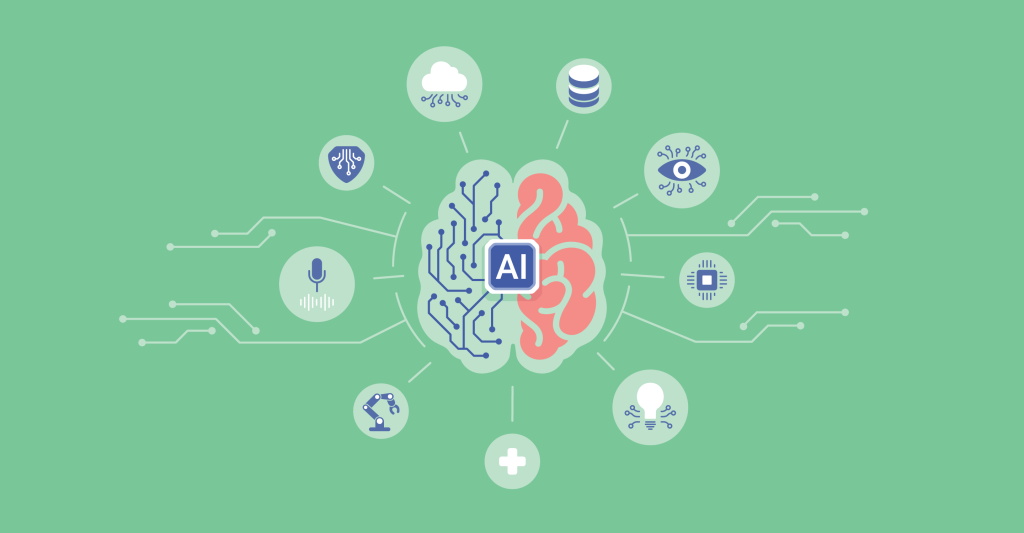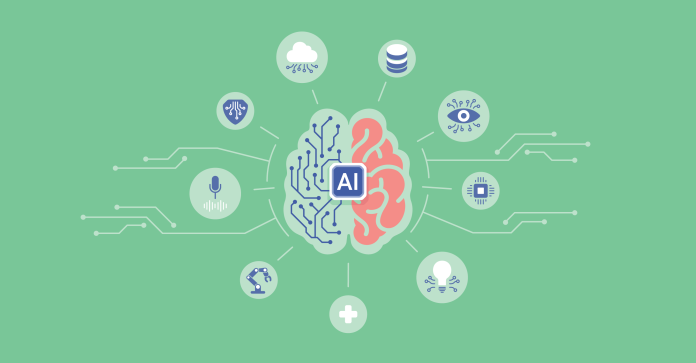AI technology is a field to keep an eye on, as big players like Amazon, Facebook, Apple, Google, and the like are rapidly taking a stake in this industry. Today, companies are looking for systems that will enable effective work with automated, accurate, and less stressful execution processes. So, several artificial intelligence programs and software are being developed to provide a smooth workflow across multiple industries.
According to a report by Bloomberg, the generative AI market is projected to expand by 42% over the next ten years, amounting to over $1.3 trillion. Furthermore, with the growth of consumer generative AI programs such as Google’s Bard and OpenAI’s ChatGPT, AI technology is the future. Unfortunately, jobs may no longer be done conventionally and a lot of people may be laid off from their jobs.

However, if you can learn the relevant skills on how to build and control these systems, you’ll be highly sought after. So now is the time to learn about artificial intelligence and build the requisite skills so you can stay relevant as times evolve. This piece has been carefully curated to provide you with a basic understanding of artificial intelligence, and how it works. Therefore, ensure to read through every paragraph so you don’t miss any vital information.
What Is Artificial Intelligence (AI)?
Artificial intelligence (AI) is a branch of computer science that is focused on the development of smart machines capable of performing tasks that typically require human intelligence. Similarly, AI is an advanced technology that uses real-time data to replicate human intelligence and is often powered by a set of algorithms, computers, or robots. As a result, it enables machines to mimic, and improve upon the capabilities of the human mind and make real-time decisions.
Furthermore, AI Technology has aided in the development of self-driving cars, robots, and generative AI tools like ChatGPT and Google’s Bard. Today, AI is increasingly becoming part of everyday life, and almost every company across various industries is diving into this technological revolution.
Why is Artificial Intelligence Important?
Typically, the advances in AI Technology have helped in shaping many industries; from conventional business, finance, media, healthcare, and the internet, AI is improving efficiency, and opening doors to entirely new opportunities.
Firstly, all humans are prone to make mistakes and certain mistakes can be costly. However, through machine learning algorithms, vast amounts of data can be analyzed quickly, identifying patterns and problems that humans might overlook and offering suggestions to users. Therefore, AI systems can reduce human error by automating tasks that are prone to mistakes, enhancing the precision and consistency of results.
Secondly, AI removes bias from decision-making when appropriate data and information are input on them. Thus, AI can act like an advanced version of automation, meaning it can be used to perform repetitive tasks and suggest consistent outcomes. So, it can be integrated with a chatbot into your website, operating 24/7 without fatigue, and automating communication between companies and customers
Furthermore, AI technology aids research and data analysis by processing large datasets, identifying patterns, and providing insights in minutes. Hence, with the information collected by AI, what would usually take a human month of research can now be done in significantly less time.
How Does Artificial Intelligence Work?
AI technology, in general, works by integrating large amounts of data with fast, duplicated processing and advanced algorithms, allowing software to learn automatically from patterns or features in the data. Moreover, AI is a broad field of study that includes many technologies, as well as the following fields:
#1. Machine Learning
This is the science of getting a computer to act without programming. It is thought of as the automation of predictive analytics. Hence, it uses methods from neural networks, statistics, and operations research, to find hidden insights in data without explicitly being programmed for where to look or what to conclude.
#2. Generative AI
Generative AI refers to a class of artificial intelligence algorithms designed to generate new, original content. This can include text, images, audio, or other types of data. Similarly, these models, are often based on deep learning techniques; learning patterns from existing data, and using that knowledge to create novel outputs with similar characteristics.
For example; a generative AI receives the full text for a speech just seconds after giving a chatbot (like ChatGPT) a few prompts to describe your idea. It’ll generate music, art, or images from text-based descriptions. Consequently, Generative AI has applications in various fields, such as content creation, art, and language generation.
#3. Neural Networks
Neural networks are computational models inspired by the structure and function of the human brain. They consist of interconnected nodes, or artificial neurons, organized in layers. Typically, the input layer receives data, which is then processed through hidden layers using weights that adjust to minimize the difference between predicted and actual outcomes. The final layer produces the output. Generally, neural networks excel in tasks like image and speech recognition, natural language processing, and other complex pattern recognition problems.
#4. Machine Vision
Typically, Machine Vision involves using computer systems to interpret and make decisions based on visual data from the world. Thus, it includes technologies like image processing, pattern recognition, and computer vision to enable machines to “see” and understand their surroundings, similar to human vision. This is widely used in industrial applications, medical image analysis, robotics, quality control, and various fields where automated visual analysis is beneficial.
How Is Artificial Intelligence Used?
Generally, as the world is navigating towards AI technology, there is a growing need for AI capabilities in many sectors. Today, various AI systems can be used for automation, learning, legal assistant, and research. Here are specific uses of AI in various industries:
#1. Health Care
Al technology is already revolutionizing the healthcare sector. Today, sophisticated systems are being developed to make work in health care become more efficient and improve patient outcomes. Now, artificial intelligence are used for diagnoses and provide personalized medicine and X-ray readings. Similarly, artificial intelligence acts as a personal health care assistants. Hence, it can be programmed to schedule appointments, understand the billing process, remind you to take your pills, and exercise or eat healthier.
#2. AI in Business
Typically, machine learning algorithms are being integrated into analytics and customer relationship management (CRM) platforms to uncover information on how to better serve customers. Today, Chatbots have been incorporated into websites to provide immediate feedback and service to customers. In addition, AI provides virtual shopping capabilities that offer personalized recommendations and discuss purchase options with the consumer.
#3. Entertainment and Media
AI technology has contributed a great deal to enhancing the entertainment industry. Now, entertainment business uses AI techniques for content creation, targeted advertising, recommending content, distribution, detecting fraud, and creating and also editing scripts. Likewise, automated journalism helps newsrooms streamline media workflows reducing time, costs, and complexity.
#4. Banking Sector
Artificial Intelligence enhances the speed, precision, and effectiveness of human efforts. In financial institutions, AI techniques can be used to identify which transactions are likely to be fraudulent, adopt fast and accurate credit scoring, as well as automate manually intense data management tasks. Moreover, banks are employing chatbots to create awareness of service, automate feedback, and handle transactions that don’t require human intervention.
#5. Education Sector
Typically, AI is used in the education sector to automate grading, giving educators more time for other tasks. Hence, it can assess students and adapt to their needs, provide additional support to students, and help them work at their own pace and stay on track.
Similarly, technology could also change where and how students learn, perhaps even replacing some teachers. Furthermore, through systems like ChatGPT, Google Bard, and other large language models, generative AI can help educators craft coursework and other teaching materials, which will make work less tedious.
#6. Manufacturing Industry
Generally, the manufacturing industry has been at the forefront of incorporating robots into the workflow. Furthermore, AI technology can analyze factory IoT data as it streams from connected equipment to forecast expected load and demand using recurrent networks, a specific type of deep learning network used with sequence data
Frequently Asked Questions About How the AI Technology Works
How does AI work for beginners?
AI develops algorithms that use machine learning to accomplish tasks such as pattern recognition, data analysis, prediction, and decision-making without the need for explicit programming. To fully understand the concepts of artificial intelligence technology, begin by researching basic concepts like supervised learning, unsupervised learning, and reinforcement learning.
How to use artificial intelligence?
Typically, AI can be used to build chatbots, use machine learning for data analysis, create picture or speech recognition apps, and more. To use AI technology, first define your goal, then explore appropriate AI frameworks and tools, or consider leveraging pre-built APIs for specific tasks.
How can I build AI software?
Here is a general step on how you can build AI software:
- Clearly define the problem you want the AI to solve.
- Gather relevant data for training and testing your AI model.
- Choose an AI model that fits your problem.
- Clean and prepare the data for model training.
- Build and train the model.
- Test the model performance.
- Implement the model into your software or system.
Where does AI get data from?
AI extracts data from diverse sources including public datasets, private company records, web scraping, sensors, IoT devices, user-generated content, surveys, feedback forms, and APIs
Can I learn AI on my own?
Yes, you can learn AI on your own through online courses, tutorials, resources, and, consistent practice.
Conclusion
Finally, the AI technology industry is changing the way things are done, partly because AI can analyze vast volumes of data much faster and make predictions more accurately than humans can. Also, the rising demand for generative AI products could add about $280 billion in new software income. You are alive in one of the most amazing times in history. Therefore, this is the best time to learn all you can and be properly positioned to milk the market.
References
- techtarget.com – A guide to artificial intelligence
- forbes.com – What Is Artificial Intelligence (AI) And How Does It Work?
- hubspot.com – How AI Works?




